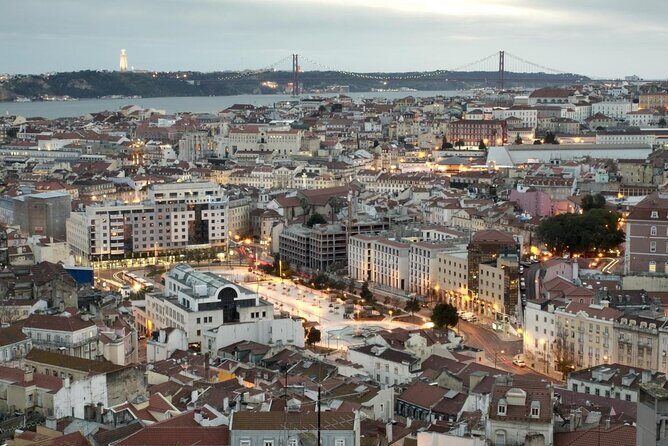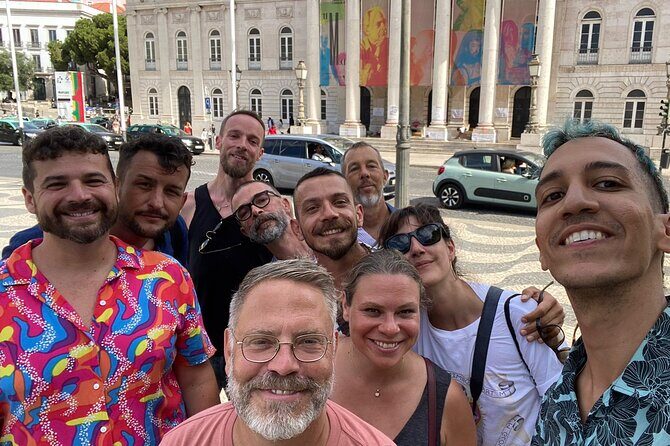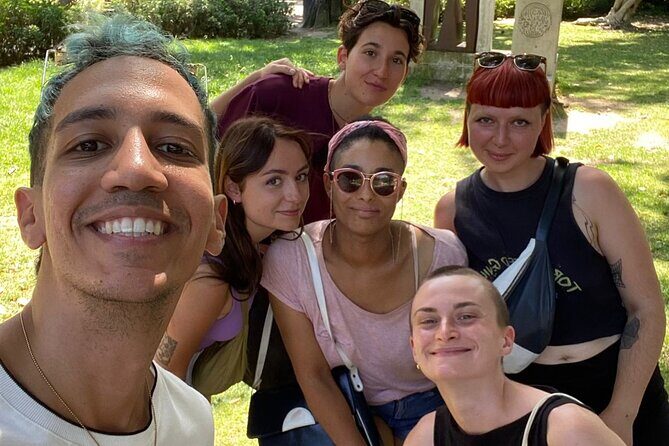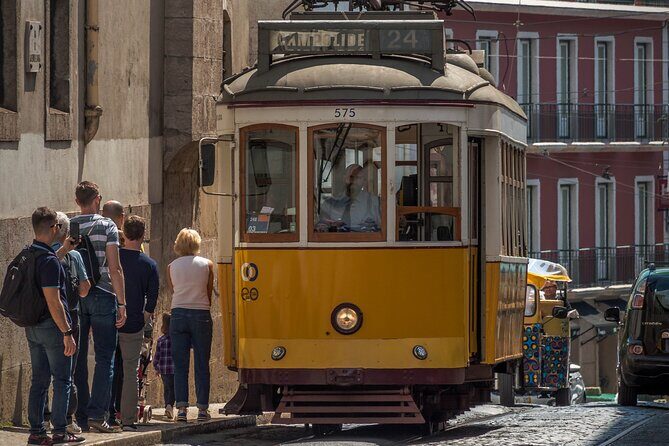Imagine wandering through Lisbon’s lively streets, feeling the weight of history, and celebrating the city’s vibrant queer scene—all in one engaging walk. Priced at $71.15 per person and lasting about 4 hours, this private tour offers a thoughtful exploration of Portugal’s LGBTQ+ history, from the struggles of the past to the colorful movements of today. Led by knowledgeable guides, you’ll visit meaningful sites, get inspired by inspiring figures, and end the day at a renowned queer venue with delicious Portuguese tapas.
What we love most about this tour is how it combines historical insight with contemporary activism—you’ll walk through the streets that shaped Portuguese queer identities, learn about resistance against repression, and see how the city’s evolving social landscape reflects broader shifts in gender and sexuality rights. Plus, the inclusion of a curated Queer Map of Lisbon means you’ll have a valuable resource to explore the city’s LGBTQ+ scene long after the tour ends.
A possible consideration is that the tour’s focus on history and activism might mean some stops are more reflective than playful or party-oriented—perfect if you’re interested in meaningful experiences. It’s especially suited for those curious about Portugal’s colonial past, revolutionary history, and current queer movements, making it ideal for travelers who want a deeper understanding of the city’s social fabric.
Key Points

- In-depth historical focus: Traces Portugal’s colonialism, revolution, and LGBTQ+ activism.
- Authentic local insights: Led by guides familiar with Lisbon’s queer community and history.
- Stunning city views: Enjoy scenic viewpoints like Bairro Alto’s vistas.
- Community & activism: Visits sites linked to resistance and contemporary movements.
- Cultural immersion: Ends at a queer-owned venue with Portuguese tapas.
- Resourceful guide: Includes a curated Queer Map of Lisbon for further exploration.
A Closer Look at the Queer Lisbon Historical Tour

Interested in history? Here are other past-focused experiences we've examined in Lisbon
Starting Point: Principe Real and the LGBTQ+ Roots
Our journey kicks off at Principe Real, where a monument honors victims of homophobia. This site offers a poignant reminder of the past struggles for LGBTQ+ rights. Here, our guide provides a brief overview, setting the tone for an exploration that mixes history, activism, and hope.
This initial stop is especially meaningful because it helps us understand the very beginnings of Portugal’s queer movement—from the first Pride marches to early demonstrations. It’s a place that invites reflection on how far the country has come, and where it still strives to go. Visitors can expect a respectful, insightful introduction to the social changes that shaped Lisbon’s queer identity.
Exploring Bairro Alto, Bica & Cais do Sodré
Next, we wander through Bairro Alto, an iconic neighborhood known for its lively nightlife, colorful streets, and scenic viewpoints. Our walk includes a pause at a viewpoint where we can gaze over the city’s hills—an excellent photo opportunity and a moment to appreciate Lisbon’s stunning landscape.
During this segment, the guide discusses how LGBTQ+ spaces transform from day to night, revealing the neighborhood’s layered identity. We learn about patriarchal and colonial influences still evident in society and consider whether inclusion in Portugal truly reaches all corners. This part of the tour challenges us to think about privilege, accessibility, and ongoing social change.
Largo Trindade Coelho: The Role of the Church
At Largo Trindade Coelho, we observe the monument of Padre António Vieira, a Jesuit priest with a complex legacy. The guide explains how the church historically regulated sexuality and influenced societal attitudes toward deviations from normative behavior.
This stop highlights how religious institutions historically maintained control over notions of morality and sexuality—lessons that resonate in discussions about ongoing debates around LGBTQ+ rights today. Visitors will find this an enlightening look at the power dynamics that impacted queer lives over centuries.
Largo do Carmo and Portugal’s Long-Lasting Dictatorship
The next stop is Largo do Carmo, a site deeply connected to the Portuguese revolution and the end of a long dictatorship. Here, we explore how authoritarian rule enforced a strict family model—a man, a wife, and children—while resistance figures, many LGBTQ+ individuals among them, challenged this oppressive order.
This part of the tour emphasizes how political regimes can influence societal norms and the importance of resistance. It also introduces us to LGBTQ+ figures who fought against repression, illustrating the resilience present in Portuguese history.
Praça Martim Moniz: Contemporary Queer Movements & Immigration
Moving to Praca Martim Moniz, we discuss how modern queer movements are reshaping Lisbon’s social landscape. This includes the influence of immigrant communities, which bring new perspectives, resilience, and vibrancy to the LGBTQ+ scene.
Our guide raises questions about inclusion and diversity, reminding us that Lisbon’s LGBTQ+ community is dynamic, multi-layered, and constantly evolving. This segment makes it clear that the fight for equality is ongoing and that Lisbon’s scene is both historic and forward-looking.
Ending at Criolense Kitchen Club in Graça
The tour concludes at a queer-owned venue in the Graça neighborhood, paying homage to Black queer resistance. Here, we get to relax, share stories, and enjoy Portuguese tapas—a perfect way to celebrate the journey.
This final stop underscores the importance of community and representation, especially for marginalized groups within the LGBTQ+ space. The venue’s significance in the neighborhood highlights Lisbon’s inclusive spirit and the ongoing activism within its queer community.
What’s Included and What’s Not

Your ticket provides a curated Queer Map of Lisbon, which is an invaluable resource for exploring the city’s LGBTQ+ venues, artists, and services. The tour is led by Portuguese and English-speaking guides, offering accessible insights. The price reflects a focus on quality and depth, making it a valuable investment for travelers seeking meaningful cultural and historical understanding.
Food and drinks are not included, giving you the flexibility to choose your own meal—perhaps at the venue at the end, where you can indulge in Portuguese tapas and reflect on what you’ve learned.
Practical Details and Tips

- The tour starts at Misericórdia and ends in Graça, both accessible by public transportation.
- It’s a private tour, so you’ll have a more personalized experience.
- The tour is suitable for travelers with moderate physical fitness, as it involves walking and some standing.
- Confirmations are immediate, and free cancellations are available up to 24 hours beforehand—easy planning for your Lisbon trip.
Who Should Book This Tour?
If you’re passionate about history, social justice, or LGBTQ+ activism, this tour offers a rich, guided journey through Lisbon’s past and present. It’s perfect for culturally curious travelers who enjoy meaningful conversations and authentic local stories. Those interested in Portugal’s colonial past and revolutionary history will find it especially rewarding, as it connects these themes directly to the city’s queer history.
Final Thoughts: Is This Tour Right for You?
This Queer Lisbon Historical Tour is a rare find—a well-balanced combination of history, activism, community, and fun. The guides are praised for their knowledge and engaging style, which makes complex social issues accessible and compelling. The scenic stops, like Bairro Alto, are not just pretty pictures but opportunities to reflect on the city’s layered identities.
The tour’s focus on resistance and progress makes it particularly valuable for travelers eager to understand how Lisbon remains a city of both tradition and transformation. If you appreciate authentic stories, enjoy learning from locals, and wish to support queer-owned venues and initiatives, this experience will leave you inspired.
This is a tour best suited for adults and mature travelers interested in history, activism, and cultural diversity. It’s a fantastic way to deepen your understanding of Lisbon’s social fabric while enjoying the city’s vibrant streets and flavors.
FAQ

Is this tour suitable for all ages?
It’s primarily geared toward adults and those comfortable with walking and reflective discussions, but there are no age restrictions listed. It’s best for travelers interested in history and social issues.
Do I need to book in advance?
Yes, on average, this tour is booked 6 days ahead, and winter bookings are exclusively available through their website, making early planning advisable.
Is this a group or private experience?
It’s a private tour, ensuring a personalized experience without large crowds, making it more comfortable for discussions.
Are meals included?
No, you’ll need to pay for your own dinner or drinks, though the tour concludes at a venue with delicious Portuguese tapas.
What is the tour duration?
Approximately 4 hours, allowing enough time to visit multiple sites and absorb the stories behind them.
Are there any physical activity requirements?
Yes, travelers should have moderate physical fitness as it involves walking through various neighborhoods and standing at stops.
Is the tour accessible for people with disabilities?
The provided information doesn’t specify accessibility features, so it’s best to contact the provider for specific needs.
What’s the main focus of the tour?
It emphasizes Portugal’s LGBTQ+ history, social struggles, revolutionary moments, and contemporary movements, ending with a cultural celebration.
To sum it up, the Queer Lisbon Historical Tour offers a thoughtful, engaging way to explore the city’s complex social tapestry. It’s ideal for those seeking depth over spectacle, blending historical lessons with vibrant community stories. Whether you’re a history buff, an advocate for LGBTQ+ rights, or simply curious about Lisbon’s diverse culture, this tour promises meaningful insights and memorable moments.
More Historical Tours in Lisbon
More Tours in Lisbon
More Tour Reviews in Lisbon
More Lisbon experiences we've covered
- Queer Lisbon Historical Tour
- Lisbon Your Perfect Day in the City Custom Private Tour
- Lisbon: Half-Day Private Tuk-Tuk Tour
- Lisbon: Belem Motorcycle Side-car Tour
- Private Getaway in Sintra – Through the Hills to the Coast
- Lisbon: Wonders of Sintra & Cascais Private Day Tour
- Sintra: Truly Private Tour to Pena Palace & Regaleira
- Cruise in Lisbon on the traditional boat of 1895 with drinks (2h)
- Private Half-Day Tour to Arrabida from Lisbon
- Private tour Portugal 14 days from Lisbon
- Premium Lisbon Port Wine and Tapas Tasting
- Tuk-Tuk sightseeing in lisbon(Old town)
